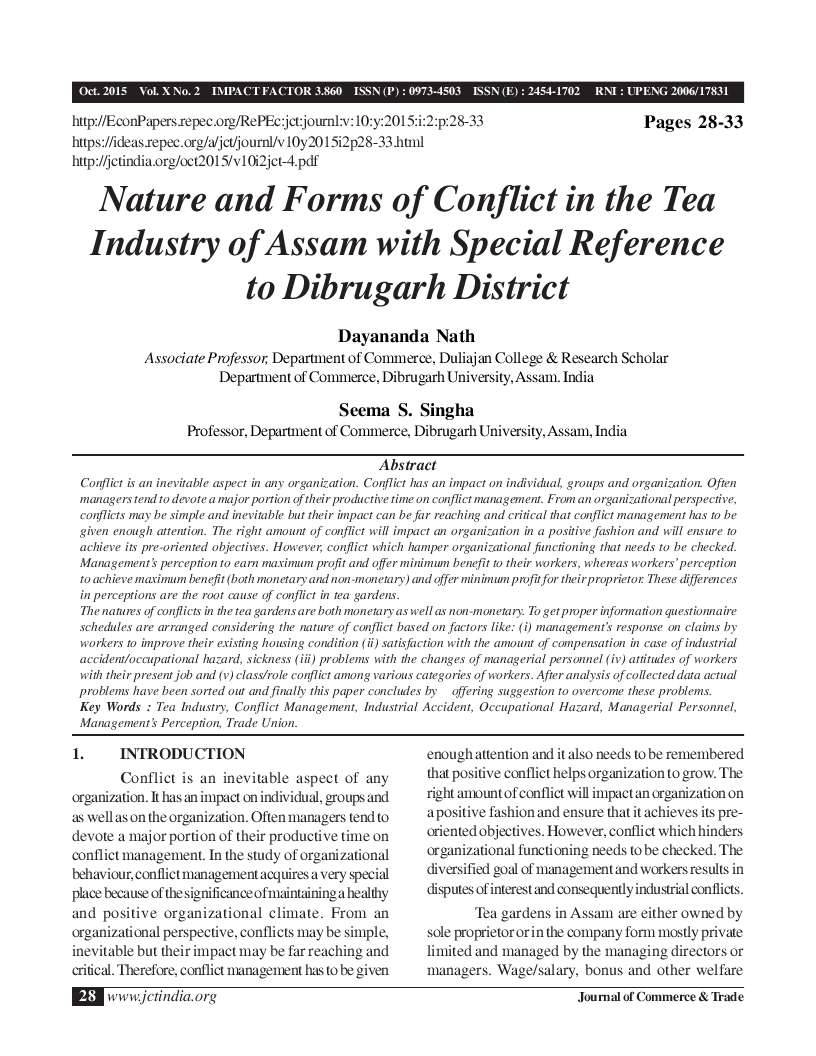Nature and Forms of Conflict in the Tea Industry of Assam with Special Reference to Dibrugarh District
DOI:
https://doi.org/10.26703/jct.v10i2.241Keywords:
Conflict Management, Tea Industry, Dibrugarh, Assam, Trade UnionAbstract
Conflict is an inevitable aspect in any organization. Conflict has an impact on individual, groups and organization. Often managers tend to devote a major portion of their productive time on conflict management. From an organizational perspective, conflicts may be simple and inevitable but their impact can be far reaching and critical that conflict management has to be given enough attention. The right amount of conflict will impact an organization in a positive fashion and will ensure to achieve its pre-oriented objectives. However, conflict which hamper organizational functioning that needs to be checked. Management’s perception to earn maximum profit and offer minimum benefit to their workers, whereas workers’ perception to achieve maximum benefit (both monetary and non-monetary) and offer minimum profit for their proprietor. These differences in perceptions are the root cause of conflict in tea gardens.
The natures of conflicts in the tea gardens are both monetary as well as non-monetary. To get proper information questionnaire schedules are arranged considering the nature of conflict based on factors like: (i) management’s response on claims by workers to improve their existing housing condition (ii) satisfaction with the amount of compensation in case of industrial accident/occupational hazard, sickness (iii) problems with the changes of managerial personnel (iv) attitudes of workers with their present job and (v) class/role conflict among various categories of workers. After analysis of collected data actual problems have been sorted out and finally this paper concludes by offering suggestion to overcome these problems.
Downloads
Metrics
References
Ahuja, Ram, 2003: Social Problems in India. Rawat Publication, Jawahar Narag, Jaipur.
Baruah, Pradip, 2008: The Tea Industries of Assam Origin and Development, Eastern Book House Publisher (India), Guwahati.
Bernard, J, 1957: The sociological study of conflict. In International Sociological Association (Ed.), The nature of conflict: Studies on the sociological aspects of international tensions. UNESCO, Tensions and Technology Series (pp. 33–117). Paris: UNESCO.
Blackard, Kirk., Gibson, Jamesw., (2003) “Capitalising on Conflict”, Jaico Publishing House, Mumbai. Guha, Amalendu, 2006: Planter Raj to Swaraj, Freedom Struggle & Electoral Politics in Assam 1826-1947,Tulika Books, New Delhi.
Kothari, C.R., 2008: Research Methodology- Methods and Techniques, New Age International Private Limited Publishers, New Delhi.
Sen, Benoy. B, 2008: Origin and Development of Tea, Eastern Book House Publishers (India), Guwahati.
Sharma, Khemraj, 2005: Sociology of Indian Tea Industry, Mittal Publications, New Delhi.
Barbash, Jack. “Collective Bargaining and the theory of Conflict”, (Journal) British Journal of Industrial Relations, Vol –XVIII, No.1, March –1980. pp 82-90.
Bemmels, Brain., Reshef Yonatan. & Devine, Key Stratton. Article “ The role of supervisors, employees, and stewards in grievance initiation”(Journal) Industrial and Labour Relations Reviews”, Vol – 45, No.1 October 1991. pp 15 -32.
Clarke, R.O. “Labour Management Dispute: A Perspective Journal) British Journal of Industrial Relations. Vol – XVIII, No.1, March 1980. pp.14-41.
Dutta, Karabi (Bora): “Working women and the work- family conflict” – (Jorunal) Assam College Teachers’ Association Journal. Vol –XXXII, Session 2008-09. pp.106-110.
Pondey, L.R. “Organisational conflict – concept and model” (Journal) Administrative Science Quarterly; 12. pp. 296-320.
Sheaba Rani, D.M. and Raju, K. Hari Narayan, article “Role conflict among women workers in informal sectors”, — Journal: The Indian Journal of Commerce. Vol: 61, No. 4,oct – December.2008 pp.202-211.
Sekar, G., article in journal “A study on bonus settlement, 1986, Indian Journal of Industrial Relations, Vol-22. No. 4, April, 1987,pp. 444—455.
Speakman, James and Lynette Ryals, 2010. A re-evaluation of conflict theory for the management of multiple, simultaneous conflict episodes, International Journal of Conflict Management. Vol. 21 Issue: 2 pp.186-201

Downloads
Published
How to Cite
Issue
Section
License
Copyright (c) 2015 Dayananda Nath, Seema S. Singha

This work is licensed under a Creative Commons Attribution 4.0 International License.














